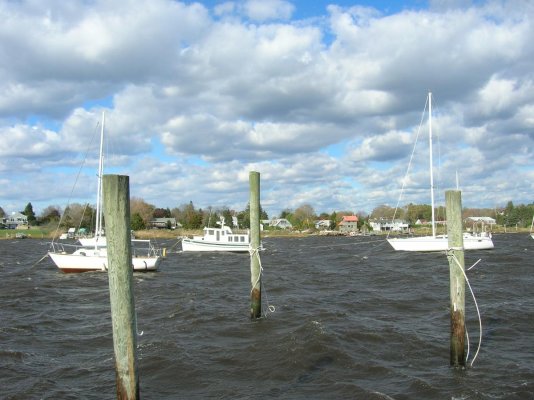Panhandler
Senior Member
My wife and I just bought a 52' trawler and live in Pensacola, FL. The insurance company would like a hurricane plan and I would appreciate your input on the options. We live on a relatively protected bayou but only 4 miles or so as the crow flies from the gulf. If we have a hurricane my wife will be at the hospital where she works and I will have to evacuate (our house has only 8' of elevation). I figure we have three options for the boat:
1) With a couple friends, I take the boat north up the Ten-Tom as far as I can leaving several days before the projected impact and then securing the boat when bad weather makes it that far north. I like this option because it will get the boat, me, and cats off the coast and hopefully preserve the boat so we can live on it after the house is likely destroyed.
2) Have a local marina pull the boat. We don't have hurricane rated facilities that I'm aware of but the local facilities do have hurricane plans to haul boats. I'm not crazy about this because it leaves the boat on the coast. To me this is still risky as the boat could fall or be caught in storm surge (depending on elevation), and the marinas I've called have waiting lists.
3) If the storm isn't projected to be too bad, leave the boat in its mooring at our house carefully prepared for storm surge and high winds. For a small tropical storm I could see this working. In the case of another hurricane Ivan the boat would probably be pushed through our house...
For those of you that need hurricane plans, what do you plan on doing? Any suggestions? Thanks
1) With a couple friends, I take the boat north up the Ten-Tom as far as I can leaving several days before the projected impact and then securing the boat when bad weather makes it that far north. I like this option because it will get the boat, me, and cats off the coast and hopefully preserve the boat so we can live on it after the house is likely destroyed.
2) Have a local marina pull the boat. We don't have hurricane rated facilities that I'm aware of but the local facilities do have hurricane plans to haul boats. I'm not crazy about this because it leaves the boat on the coast. To me this is still risky as the boat could fall or be caught in storm surge (depending on elevation), and the marinas I've called have waiting lists.
3) If the storm isn't projected to be too bad, leave the boat in its mooring at our house carefully prepared for storm surge and high winds. For a small tropical storm I could see this working. In the case of another hurricane Ivan the boat would probably be pushed through our house...
For those of you that need hurricane plans, what do you plan on doing? Any suggestions? Thanks

